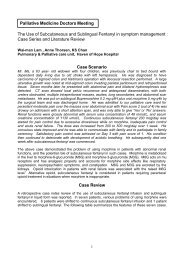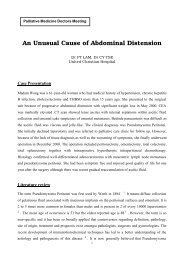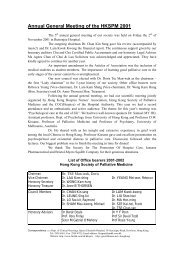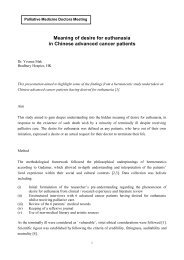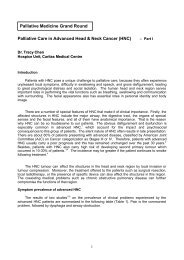Spiritual Care At The End Of Life - Hong Kong Society of Palliative ...
Spiritual Care At The End Of Life - Hong Kong Society of Palliative ...
Spiritual Care At The End Of Life - Hong Kong Society of Palliative ...
Create successful ePaper yourself
Turn your PDF publications into a flip-book with our unique Google optimized e-Paper software.
HKSPM Newsletter<br />
Conclusion<br />
<strong>Spiritual</strong> needs are present and significant for<br />
may patients in their last stage <strong>of</strong> life but many<br />
healthcare workers lack the necessary skill to<br />
uncover and address these issues (Murray 2004).<br />
In providing holistic care to our patients and their<br />
families, the spiritual aspect <strong>of</strong> the human being<br />
cannot be ignored. <strong>Spiritual</strong> care may be specially<br />
critical in palliative care where patients <strong>of</strong>ten<br />
experience existential suffering and ask spiritual<br />
questions. When a patient is at the end <strong>of</strong> life, we<br />
cannot expect any physical growth or physical<br />
healing but there is still room for spiritual growth<br />
and spiritual healing. Meeting their spiritual care<br />
needs can help to provide a patient with a good<br />
ending in his life despite his physical suffering.<br />
However, <strong>Spiritual</strong>ity is probably one <strong>of</strong> the most<br />
ignored areas in healthcare research including the<br />
palliative care field and further investigation in this<br />
area is cogently needed (McGrath 1999).<br />
Reconciliation, letting go, finding inner peace and<br />
hope facilitated by good spiritual care and support<br />
had been observed happening in many <strong>of</strong> the dying<br />
persons.<br />
Reference:<br />
1. Breitbart W (200l). <strong>Spiritual</strong>ity and meaning in support<br />
care: <strong>Spiritual</strong>ity-and meaning-centered group<br />
psychotherapy interventions in advanced cancer.<br />
Supportive <strong>Care</strong> in Cancer, 10(4): 272-280.<br />
2. Breitbart W, Heller KS (2002). Reframing hope: Meaningcentered<br />
care for patients near the end <strong>of</strong> life. An<br />
interview with William Breitbart. Innovations in <strong>End</strong>-<strong>of</strong><br />
–<strong>Life</strong> <strong>Care</strong>, 4(6): www.edu.org/lastacts.<br />
3. Chochinov HM (2002). Thinking outside the box:<br />
Depression, hope, and meaning at the end <strong>of</strong> life:<br />
Innovations in <strong>End</strong>-<strong>of</strong>-<strong>Life</strong> <strong>Care</strong>, 4(6): www.edc.org/lastacts.<br />
4. Chao CSC (1993). <strong>The</strong> meaning <strong>of</strong> good dying <strong>of</strong> Chinese<br />
terminally ill cancer patients in Taiwan. Ann Arbor, Mich:<br />
University Micr<strong>of</strong>ilms International.<br />
5. Frankl V (1939). Man’s searching for meaning. New York:<br />
Pocket Books.<br />
6. Herth K (1990). Fostering hope in terminally ill people.<br />
Journal <strong>of</strong> Advanced Nursing, 15, 1250-1259.<br />
7. King DE (2000). Faith, <strong>Spiritual</strong>ity, and Medicine. New York:<br />
<strong>The</strong> Haworth Pastoral Press.<br />
8. Keonig H,.McCullough ME, Larson DB (2001). Handbook <strong>of</strong><br />
Religion and Health. New York: Oxford University Press.<br />
9. McGrath P. Review: exploring spirituality through<br />
research: an important but challenging task. Prog Palliat<br />
<strong>Care</strong> 1999: 7: 3-9<br />
10. Murray SA, Kendall M, Boyd K, Worth A, Benton TF.<br />
Exploring the spiritual needs <strong>of</strong> people dying <strong>of</strong> lung cancer<br />
or heart failure: a prospective qualitative interview study <strong>of</strong><br />
patients and their carers. <strong>Palliative</strong> Medicine t 2004; 18:<br />
39-45.<br />
11. O’Gorman ML (2002). <strong>Spiritual</strong> care at the end <strong>of</strong> life.<br />
Critical <strong>Care</strong> nursing Clinics <strong>of</strong> North America 14 (2): 171-<br />
176,viii.<br />
12. Scottish Executive Health Department. Guidelines on<br />
chaplaincy and spiritual care in the NHS in Scotland.<br />
Edinburgh: Scottish Executive, 2002.<br />
13. Shelly, JA (2000). <strong>Spiritual</strong> <strong>Care</strong>: A guide for caregivers.<br />
Illinois: Inter Varsity Press.<br />
14. Sulmasy DP (2002). A biopsychosocial-spiritual model for<br />
the care <strong>of</strong> patients at the end <strong>of</strong> life. <strong>The</strong> Gerontologist,<br />
.42, (Special Issue III): 24-33.<br />
15.Yuan, HS (1998). <strong>The</strong> needs and care <strong>of</strong> terminally<br />
ill patient (). Retrieved<br />
December 1,2004 from Cancer.org.tw website:<br />
http://www.cancer.org.tw/Library/Content7_Detail.aspID=1252<br />
(in Chinese).<br />
Figure I: <strong>The</strong> “3Rs” Phenomenon<br />
leading to a peaceful death<br />
RECONCILIATION with self,<br />
others and GOD<br />
“For God was pleased to have all his fullness dwell in him, and through him to RECONCILE to himself all<br />
things, whether things on earth or things in heaven, by making peace through his blood, shed on the cross.<br />
Once you were alienated from God and were enemies in your minds because <strong>of</strong> your evil behavior. But<br />
now he has reconciled you by Christ’s physical body through death to present you holy in his sight, without<br />
blemish and free from accusation” (Colossians 1: 19-22)<br />
HKSPM Newsletter Mar 2004 Issue 1 : p 10



